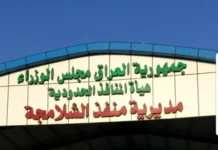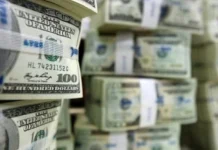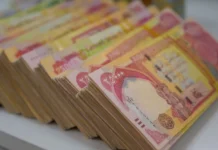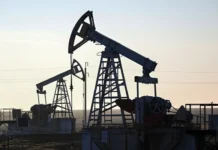Tishwash: hmmmmm I guess they mean it this time?
His financial advisor: The dollar exchange rate in the parallel market is gradually approaching the official one
Today, Thursday, Adviser to the Prime Minister for Financial Affairs, Mazhar Muhammad Saleh, explained the dangers of the exchange rate fluctuations in the event that demands for floating the dinar are met, while confirming that the dollar exchange rate in the parallel market is gradually approaching the official one.
Saleh said to the official agency, followed by Mawazine News, that “calls for floating the dinar to end the gap between the official exchange rate and the parallel market may be possible in an economy in which the free market alone influences the movement of the balance of payments, and not in an economy in which the rentier government sector is dominant and generates currency reserves.”
Foreign currency, as the monetary authority alone is the main source of supply of foreign currency that meets the desired demand for foreign exchange in the money market, to provide stability in this market and achieve a desired and homogeneous exchange rate through the interventionist role played by monetary policy.
He added, “Claims for flotation mean in all cases adopting the prevailing exchange rate in the parallel market to achieve the goal of stability and balance in the official exchange rate itself at a new point reached by the market at the end of the supposed flotation policy and returning to stability again.
Also, the flotation scenario means in all cases the withdrawal of the authority.” Cash from being an essential central supply of foreign currency, to be replaced by new forces supplying foreign currency from free market makers, which only have a weak, limited supply of foreign exchange, and at the same time they carry an uncontrolled package of inflationary expectations and are called in economic literature the forces generating expectations. “inflationary”.
He continued, “The hypothetical new supply forces for foreign exchange adopted by the exchange market in that scenario will mean the dominance of supply forces from speculators with very limited quantities of foreign exchange available for supply in the parallel market, matched by an open demand for foreign currency on the part of the market that undoubtedly exceeds that limited parallel supply.” of foreign exchange, perhaps by more than 10 times at least in our estimation, and such a policy of floating to achieve a homogeneous equilibrium exchange rate would be an open and perhaps unruly situation, as long as the central government supply of foreign currency would be absent from the market, and we would not then obtain any equilibrium point in the exchange rate.
An exchange rate that is sought to float except with a widespread deterioration of the exchange rate as long as it is controlled by forces that generate inflationary expectations, as we noted in a highly unilateral rentier economy, and it is an exchange rate whose mechanisms will move in a market that is incomplete in terms of production in its compensation for the required supply of goods and services.
Saleh warned, “Then no one knows how much the new exchange rate resulting from the flotation will be, which will undoubtedly be accompanied by a prior wave of inflationary expectations, which is a dangerous wave whose directions are difficult to control, which may force monetary policy according to this floating scenario by intervening with foreign reserves.” It is an unjustified extravagance in foreign exchange to impose a state of stability in the general level of prices again just to adopt it when exchange rates reach low rates, and no one knows how much they will reach.”
He pointed out that “the difference in the two prices currently, in which the parallel market is gradually approaching the official market, did not come about due to the short supply of foreign exchange at the Monetary Authority, but rather came about due to a sudden external factor imposed by the compliance platform and administrative audit restrictions on external transfer movements, which is a matter related to the deficit in the authority’s reserves.”
Cash is about bringing the two prices closer in light of a very high level of foreign reserves. The commercial efficiency of those reserves is the highest in Iraq’s financial history, and they are covered in foreign currency that touches more than 16 months of imports compared to the global standard of three months of imports. link
**************
Tishwash: New agreements between Iraq and Iran on facilitating trade
Iranian media reported today, Wednesday (May 1, 2024), that Iraq and Iran have reached new agreements on facilitating trade movement between the two countries.
Mohammad Rezvani Far, Deputy Minister of Economy and Director General of Iranian Customs, and Hassan Hammoud Hassani, Advisor to the Ministry of Finance and Director General of Iraqi Customs, emphasized the facilitation of trade in addition to the new customs agreements between the two countries.
The Iranian official agency, according to what was translated by “Baghdad Today”, quoted Radwani as saying, “This meeting along the long borders and near 5 important provinces bordering Iran and Iraq, which requires doubling trade between Iran and Iraq, and developing relations, coordination and cooperation.”
Radwani added, “Regular border meetings between border customs directors in the two countries can contribute to the effectiveness of this cooperation,” indicating that “Iranian Customs is fully prepared to exchange customs information with Iraqi Customs in order to facilitate and develop trade.”
The Iranian official considered that “exchanging and coordinating procedures and policies and applying similar methods at various border points, in addition to matching working days and hours in customs offices in the two countries, is important and vital for trade exchange.”
The Iranian Deputy Minister of Economy called for “expediting notification of changes in customs procedures and regulations in the two countries.”
Radwanifar stated that “the cornerstone of customs policies to facilitate and develop trade lies in the World Customs Organization,” noting “the importance of this organization,” calling for “consensus and consultation among Islamic countries in promoting common goals and interests.”
For his part, the head of the Iraqi Customs Authority, Hassan Hamoud Hassani, described the Iranian side as “one of Iraq’s most important trading partners, and included developing trade relations between the two countries as one of his country’s priorities.”
He expressed his satisfaction with “the progress of customs cooperation between the two countries,” expressing his hope to “follow up on common issues with continued cooperation and exchange of views.”
The head of Iraqi customs promised to “continue coordination between his government and the Iraqi Kurdistan Regional Government in order to implement customs unity in these two regions.”
Hassani also expressed his regret “about the phenomenon of fuel smuggling at the common border crossings between the two countries,” adding that “Iraqi customs will cooperate with the Iranian side in resolving this problem.”
It is noteworthy that during the meeting, it was agreed to sign an agreement on cooperation and mutual administrative assistance in customs affairs between the governments of the two countries, with the aim of facilitating the electronic exchange of customs information and providing facilities in performing customs procedures at the border level of the two countries, and agreeing to sign an agreement to facilitate the temporary entry of goods vehicles between Iran and Iraq. And the establishment of a designated parking lot outside the customs borders of the two countries in order to prevent the risks resulting from the stopping of trucks carrying fuel materials in the border area, as well as the establishment of representatives of the organizations that issue import licenses, including standards, health and quarantine units, and related organizations in the Iraqi border customs, among others. link
************
Tishwash: Al-Sudani: The government is serious about moving to a diversified economy and supporting the industrial sector
Al-Sudani in his speech at the opening of the continuous casting factory at the General Company for Steel Industries in the capital, Baghdad
The state and the government are committed to paying attention to and caring for the rights of workers, especially since the government has made important strides in guaranteeing the rights of workers at the level of legislation represented by the Labor, Retirement and Social Security Law.
The government has placed industry as an important sector for economic reform in our dear country, based on the fact that Iraq is an industrial country, just as it is an oil and agricultural country, in light of the availability of all work requirements, including raw materials and infrastructure.
We affirm the government’s commitment and seriousness to support the industrial sector to move from a country dependent on oil revenues to a diversified economy, and this goal can only be achieved with the presence of an active and financially and technically capable private sector.
Life returned to the General Company for Steel Industries by operating the continuous casting plant to convert large quantities of scrap into iron billets.
This year is a year of achievements, and the government is implementing this slogan in word and deed by opening many projects that were stalled. link





